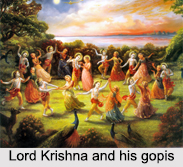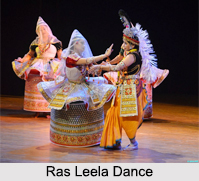 Rasa Dance also known as Rasalila is the traditional dance custom of Krishna with the Radha and the Gopis. The traditional stories of Krishna are described in Hindu scriptures like the Bhagavata Purana and literature, the Gita Govinda, where he dances with Radha and her associates or sakhis.
Rasa Dance also known as Rasalila is the traditional dance custom of Krishna with the Radha and the Gopis. The traditional stories of Krishna are described in Hindu scriptures like the Bhagavata Purana and literature, the Gita Govinda, where he dances with Radha and her associates or sakhis.The term, 'rasa' means emotion or performance and 'lila' is a concept from Hinduism, which roughly translates to 'play or lila of the dance or rasa'. Thus, Rasa Dance is known as the ‘Dance of Divine Love’.
Myths of Rasa Dance
The rasa dance is a totally religious presentation. In order to set up this fact, Krishna, the utmost spiritual, expanded himself in many forms and stood next to each gopi. Placing his hands on the shoulders of the gopis on both sides of him, he began to dance in their middle. The spiritualist expansions of Krishna were not perceived by the gopis because Krishna appeared single-handedly to each of them.
 Each gopis thought that Krishna was dancing with her alone. Over that magnificent dance flew many airplanes carrying the denizens of the wonderful planets, who were very worried to see the superb dance of Krishna with the gopis. The Gandharvas and the Kinnaras began to sing, and, accompanied by their respective wives, all the Gandharvas began to shower flowers on the dancers. As the gopis and Krishna danced mutually, a very peaceful musical sound was produced from the tinkling of their bells, ornaments and bangles. It appeared that Krishna was a greenish navy locket in the midst of a golden necklace decorated with priceless stones. While Krishna and the gopis danced, they displayed amazing bodily features. The movements of their legs, their placing their hands on one another, the movements of their eyebrows, their smiling, their clothes, their earrings, their cheeks, their hair with flowers - as they sang and danced these combined together to come into sight like clouds, boom, snow and lightning. Krishna’s bodily features appeared just like a group of clouds, their songs were like thunder, the beauty of the gopis appeared to be just like lightning in the sky and the drops of perspiration noticeable on their faces appeared like falling snow. In this way, both the gopis and Krishna were fully busy in dancing.
Each gopis thought that Krishna was dancing with her alone. Over that magnificent dance flew many airplanes carrying the denizens of the wonderful planets, who were very worried to see the superb dance of Krishna with the gopis. The Gandharvas and the Kinnaras began to sing, and, accompanied by their respective wives, all the Gandharvas began to shower flowers on the dancers. As the gopis and Krishna danced mutually, a very peaceful musical sound was produced from the tinkling of their bells, ornaments and bangles. It appeared that Krishna was a greenish navy locket in the midst of a golden necklace decorated with priceless stones. While Krishna and the gopis danced, they displayed amazing bodily features. The movements of their legs, their placing their hands on one another, the movements of their eyebrows, their smiling, their clothes, their earrings, their cheeks, their hair with flowers - as they sang and danced these combined together to come into sight like clouds, boom, snow and lightning. Krishna’s bodily features appeared just like a group of clouds, their songs were like thunder, the beauty of the gopis appeared to be just like lightning in the sky and the drops of perspiration noticeable on their faces appeared like falling snow. In this way, both the gopis and Krishna were fully busy in dancing.For more, visit the link below: